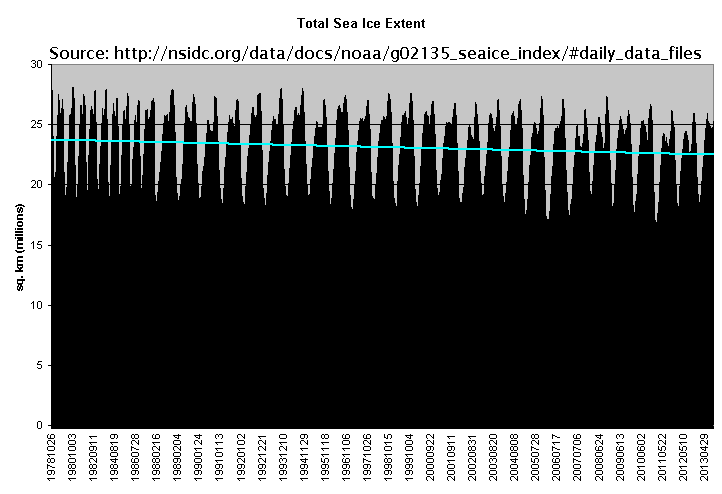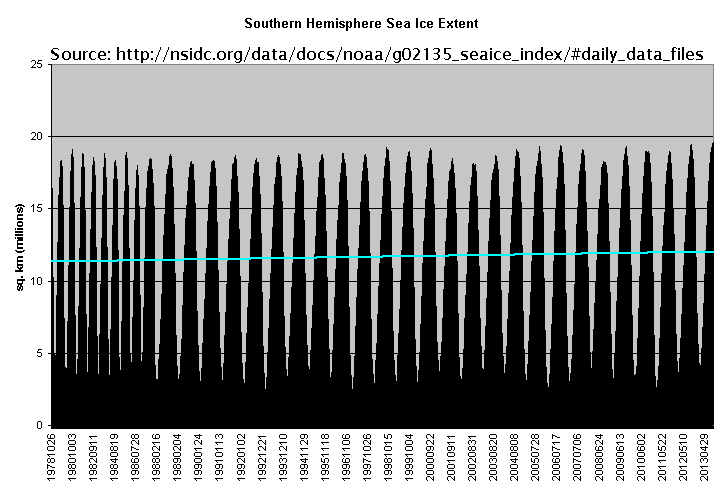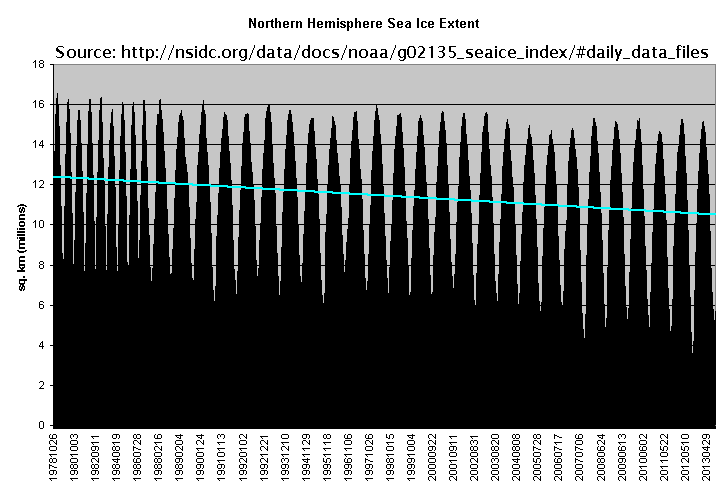It looks like you're using an Ad Blocker.
Please white-list or disable AboveTopSecret.com in your ad-blocking tool.
Thank you.
Some features of ATS will be disabled while you continue to use an ad-blocker.
9
share:
But don't worry, it doesn't mean its getting cooler there, something to do with the wind and land areas. The globe is still getting warmer
Hooray!
www.theaustralian.com.au... 6
In case you cant access this for whatever reason, here is the article in full
www.theaustralian.com.au... 6
In case you cant access this for whatever reason, here is the article in full
Record Antarctic sea ice is forcing scientists to consider relocating research bases as they struggle to cope.
Satellite observations show a new daily record being set for Antarctic sea ice every day for the past two weeks. Annual records have also been broken every year for the past three years.
Rob Wooding, general manager of the Australian Antarctic Division’s Operations Branch, said expanding sea ice was now causing serious problems.
Last year, fuel supplies were flown to Australia’s Mawson base by helicopter because the harbour had failed to clear. Dr Wooding said the situation was “unsustainable”.
He said it was possible for the Aurora Australis icebreaker to break through a certain amount of sea ice to enter the harbour, and the planned capability of a replacement icebreaker would increase the ability to do this.
But conditions experienced last year of thick sea ice, with snow cover, extending out 40 to 50km could not regularly be navigated by any Antarctic resupply vessel.
GRAPHIC: Changes in Antarctic sea ice extent
“If we were to face such a situation at Mawson for three or four successive seasons, it would be unlikely that we could continue to resupply the station under the current operating model,” he said. “Unless we could find an alternative resupply strategy, questions would arise as to the ongoing viability of the station.”
French scientists have already been forced to resupply their bases over ice and a number of radical solutions are being considered, including bigger icebreakers, air drops and hovercraft.
The world’s leading Antarctic supply teams and scientists are meeting in Hobart this week to discuss plans in light of the strong trend in growing Antarctic sea ice extent.
Dr Wooding said the growing sea ice presented many logistical problems.
Seasonal growth in Antarctic sea ice is now under way and is expected to peak at another record level in September. Scientists say the increases in sea ice mask much larger regional changes in sea ice distribution, as well as changes in the physical properties of the ice itself. Professor Tony Worby, chief executive of the Climate and Ecosystems Co-operative Research Centre, said expanding Antarctic sea ice had not been expected initially with climate change, but was now better understood.
While the overall Antarctic ice mass was reducing, sea ice was expanding due largely to changed wind patterns driven by ozone depletion, greenhouse gas accumulation in the atmosphere and natural variability. Recent research had also shown the ice is thicker than previously thought.
“Sea ice is one of the most difficult to get right in numerical models,” Professor Worby said.
He said sea ice expansion had been in “very significant contrast to ice extent in the Arctic”.
One reason for the difference, he said was Arctic sea ice was land locked but Antarctic sea ice was surrounded by ocean and free to expand as wind patterns changed.
coming from a place which freezes up every winter:
thicker Ice means
its colder longer
thicker Ice means
its colder longer
It is that time of the year when the Antarctic Ice expands as their winter is approaching. Also the link you provided appears to be broken.
I'll check back later to see if it's just a temporary 404./
Also there is no evidence of this in the article, it is all hearsay.
What satellites have documented the 'record ice growth'? Where is the data from that(those satellites), ect.. From my perspective the article offers nothing but hearsay and no tangible evidence of the OP's title.
I'll check back later to see if it's just a temporary 404./
Also there is no evidence of this in the article, it is all hearsay.
What satellites have documented the 'record ice growth'? Where is the data from that(those satellites), ect.. From my perspective the article offers nothing but hearsay and no tangible evidence of the OP's title.
edit on 11-5-2015 by jrod because: (no reason given)
originally posted by: jrod
It is that time of the year when the Antarctic Ice expands as their winter is approaching. Also the link you provided appears to be broken.
I'll check back later to see if it's just a temporary 404./
Also there is no evidence of this in the article, it is all hearsay.
What satellites have documented the 'record ice growth'? Where is the data from that(those satellites), ect.. From my perspective the article offers nothing but hearsay and no tangible evidence of the OP's title.
Would NASA do?
www.nasa.gov...
Or the National Snow and Ice Data Center? They are pretty much the end all and be all as far as ice data, including the satellite data that you have been asking for:
nsidc.org...
edit on 12-5-2015 by bronco73 because: (no reason given)
This video sums it up.
It is interesting how the this is happening. It does appear the overall Ice volume is decreasing (Arctic loss + Antarctic gain)
originally posted by: jrod
This video sums it up.
It is interesting how the this is happening. It does appear the overall Ice volume is decreasing (Arctic loss + Antarctic gain)
Which I find concerning... and not from a climate change perspective either. Just worrisome IMO that the change in weight balance of the planet may possibly end up being a cause for a planetary shift on it's axis. Major sea ice loss at one pole with major sea ice gain at the other, for a sustained amount of time... I just wonder if that wouldn't be enough to cause the globe to "roll" on it's axis
Try this link
No, that doesnt work. I dont get it, if I click on the google news link it takes me there, if I paste the address in the address bar it tells me to subscribe.
This one is from the Daily Mail
www.dailymail.co.uk...
No, that doesnt work. I dont get it, if I click on the google news link it takes me there, if I paste the address in the address bar it tells me to subscribe.
This one is from the Daily Mail
www.dailymail.co.uk...
edit on 12/5/15 by Cinrad because: (no reason given)
originally posted by: jrod
From my perspective the article offers nothing but hearsay and no tangible evidence of the OP's title.
Of course it does
But you're correct, that's all that this article does offer.
Also there is no evidence of this in the article, it is all hearsay.
Valid concern...although I've seen the data many other places. This is not meant to be a pot shot (whatever that means), but I thought the fact that Antactica was consistently breaking records for amounts of ice (overall) was common knowledge at this point in the global warming debate. (slightly decreasing on the Western shelf, but gaining everywhere else...plus, much of the western decrease is being possibly attributed to under-ice volcanoes that have just been confirmed to exist)
In fact, I'm quite certain that I've posted links to that that data for you on previous discussions.
a reply to: SlapMonkey
It isn't breaking records for ice overall. At least not for gains but it is losing ice at record levels.
Even in this article it states.
That is exactly the opposite of what you stated.
Antactica was consistently breaking records for amounts of ice (overall) was common knowledge at this point in the global warming debate.
It isn't breaking records for ice overall. At least not for gains but it is losing ice at record levels.
Even in this article it states.
While the overall Antarctic ice mass was reducing, sea ice was expanding due largely to changed wind patterns driven by ozone depletion, greenhouse gas accumulation in the atmosphere and natural variability.
That is exactly the opposite of what you stated.
faster Gravity data show that Antarctic ice sheet is melting increasingly
April 30, 2015
During the past decade, Antarctica's massive ice sheet lost twice the amount of ice in its western portion compared with what it accumulated in the east, according to Princeton University researchers who came to one overall conclusion -- the southern continent's ice cap is melting ever faster.
a reply to: bronco73
There is a theory that as the next ice age (or major glaciation event) draws closer, the globe enters a sort of see-saw phase with the poles going back and forth between record ice cover at one end and ice loss at the other.
So this could be worrying from that perspective too.
Wouldn't it be just a b**** for mankind to cripple their ability to adapt to a new glaciation in terms of energy production and industrial base because we thought if we all went back to nature and grubbed a living in caves we'd save the planet?
There is a theory that as the next ice age (or major glaciation event) draws closer, the globe enters a sort of see-saw phase with the poles going back and forth between record ice cover at one end and ice loss at the other.
So this could be worrying from that perspective too.
Wouldn't it be just a b**** for mankind to cripple their ability to adapt to a new glaciation in terms of energy production and industrial base because we thought if we all went back to nature and grubbed a living in caves we'd save the planet?
originally posted by: Danbones
coming from a place which freezes up every winter:
thicker Ice means
its colder longer
There's plenty of factors at play, but that doesn't seem to be one of them.
This article will help you in developing an informed opinion,
Hope it helps,
NASA: Antarctic Sea Ice Reaches New Record Maximum
a reply to: Grimpachi
I'll give it another look, but I'm quite positive that I've read articles that have stated that it's gaining overall, but not by much--I know it's gaining sea ice and reached record levels last year for that, so I'm possibly confusing the sea ice and the land ice. If so, disregard that part of my comment.
Regardless, a big reason why the western side is losing ice at such a high rate has been shown to be accelerated due to the volcanic activity below the ice more than anything above the ice (weather)...at least that's one of the newer theories that tends to make more sense to me compared to just simply atmospheric changes. Otherwise, how can scientists make sense out of the fact that sea ice around the western area of Antarctica is gaining ice, yet land ice is being lost? If it were atmospheric, it would affect both land and sea ice, wouldn't it?
ETA:
Here is an example of what I'm talking about. Of course, it has to come from a skeptical website, but you can't allow that to make you dismiss the data contained within.
I'll give it another look, but I'm quite positive that I've read articles that have stated that it's gaining overall, but not by much--I know it's gaining sea ice and reached record levels last year for that, so I'm possibly confusing the sea ice and the land ice. If so, disregard that part of my comment.
Regardless, a big reason why the western side is losing ice at such a high rate has been shown to be accelerated due to the volcanic activity below the ice more than anything above the ice (weather)...at least that's one of the newer theories that tends to make more sense to me compared to just simply atmospheric changes. Otherwise, how can scientists make sense out of the fact that sea ice around the western area of Antarctica is gaining ice, yet land ice is being lost? If it were atmospheric, it would affect both land and sea ice, wouldn't it?
ETA:
Here is an example of what I'm talking about. Of course, it has to come from a skeptical website, but you can't allow that to make you dismiss the data contained within.
From this paper we can see:
1.Over 800 years, Antarctic ice changes all the time, but current rates of change are not unusual. The surface mass balance (SMB) “changes over most of Antarctica are statistically negligible.” The “current SMB is not exceptionally high compared to the last 800 yr.”
2.The times with highest accumulation (1370s and 1610s) match records of solar radiation.
3.Since 1960 the ice and snow accumulation has increased by 10% in high SMB coastal regions and over the highest part of the East Antarctic divide.
edit on 13-5-2015 by SlapMonkey because: (no reason given)
This data is older, but it drives the point home....
Total Sea Ice (Northern & Southern hemispheres) is declining:

Southern Sea Ice is increasing:

Northern Sea Ice is decreasing:

Sea ice is greatly influenced by wind patterns. Interestingly, when sea ice melts (almost totally for Antarctica each year) it very slightly increases sea levels. The reason for this is because sea ice is frozen freshwater which floats on denser salt water, and buoyancy comes into play; the effect is quite small.
Total Sea Ice (Northern & Southern hemispheres) is declining:

Southern Sea Ice is increasing:

Northern Sea Ice is decreasing:

Sea ice is greatly influenced by wind patterns. Interestingly, when sea ice melts (almost totally for Antarctica each year) it very slightly increases sea levels. The reason for this is because sea ice is frozen freshwater which floats on denser salt water, and buoyancy comes into play; the effect is quite small.
new topics
-
Who could it beeee now?
New World Order: 1 hours ago -
The Russian Vostok complex has been put into operation in Antarctica
Science & Technology: 1 hours ago -
Letitia James tells judge to Reject Trumps $175 Million Bond
2024 Elections: 2 hours ago -
Tucker Carlson UFOs are piloted by spiritual entities with bases under the ocean and the ground
Aliens and UFOs: 2 hours ago -
Hello from burritocat
Introductions: 3 hours ago -
An Apology From the Dunderbeck Sausage Company
Music: 6 hours ago -
Tucker on Joe Rogan talking Kona Blue and UFOs
Aliens and UFOs: 6 hours ago -
Remember These Attacks When President Trump 2.0 Retribution-Justice Commences.
2024 Elections: 7 hours ago -
Predicting The Future: The Satanic Temple v. Florida
Conspiracies in Religions: 7 hours ago -
WF Killer Patents & Secret Science Vol. 1 | Free Energy & Anti-Gravity Cover-Ups
General Conspiracies: 9 hours ago
top topics
-
The Democrats Take Control the House - Look what happened while you were sleeping
US Political Madness: 17 hours ago, 19 flags -
Biden says little kids flip him the bird all the time.
Politicians & People: 17 hours ago, 9 flags -
Man sets himself on fire outside Donald Trump trial
Mainstream News: 17 hours ago, 9 flags -
Michigan school district cancels lesson on gender identity and pronouns after backlash
Education and Media: 11 hours ago, 9 flags -
WF Killer Patents & Secret Science Vol. 1 | Free Energy & Anti-Gravity Cover-Ups
General Conspiracies: 9 hours ago, 8 flags -
Pentagon acknowledges secret UFO project, the Kona Blue program | Vargas Reports
Aliens and UFOs: 14 hours ago, 7 flags -
Boston Dynamics say Farewell to Atlas
Science & Technology: 14 hours ago, 6 flags -
Remember These Attacks When President Trump 2.0 Retribution-Justice Commences.
2024 Elections: 7 hours ago, 6 flags -
Israel attacking Iran again.
Middle East Issues: 11 hours ago, 5 flags -
The Russian Vostok complex has been put into operation in Antarctica
Science & Technology: 1 hours ago, 4 flags
active topics
-
MULTIPLE SKYMASTER MESSAGES GOING OUT
World War Three • 59 • : Zaphod58 -
Russian intelligence officer: explosions at defense factories in the USA and Wales may be sabotage
Weaponry • 180 • : WaESN -
Candidate TRUMP Now Has Crazy Judge JUAN MERCHAN After Him - The Stormy Daniels Hush-Money Case.
Political Conspiracies • 406 • : Justoneman -
Predicting The Future: The Satanic Temple v. Florida
Conspiracies in Religions • 8 • : twistedpuppy -
I Guess Cloud Seeding Works
Fragile Earth • 30 • : WaESN -
The Russian Vostok complex has been put into operation in Antarctica
Science & Technology • 7 • : BeyondKnowledge3 -
Man sets himself on fire outside Donald Trump trial
Mainstream News • 48 • : BeyondKnowledge3 -
Letitia James tells judge to Reject Trumps $175 Million Bond
2024 Elections • 5 • : Justoneman -
Israel attacking Iran again.
Middle East Issues • 45 • : ToneD -
Boston Dynamics say Farewell to Atlas
Science & Technology • 8 • : Dalamax
9
